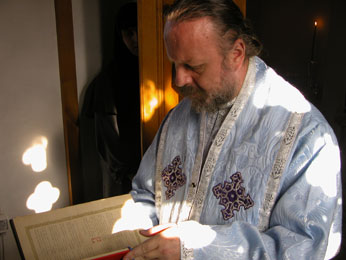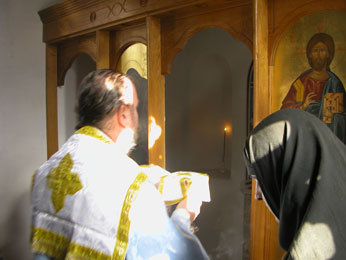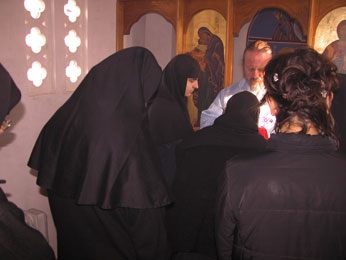Star Dojran, Divine Liturgy ( 24.11.2007 )
Today, on the day of the Holy Great Martyr Menas and the Venerable Theodore Stoudion, in the monastery of the Venerable Maximus the Confessor and Saint Gregory Palamas in Star Dojran, Metropolitan of Strumica Nahum celebrated Divine Liturgy. In the appropriate part of the Liturgy, all the faithful have prayed for resting in peace of the soul of the God's child Theodore.
While interpreting today’s reading from the Gospel, the Bishop, among else, said:
In the Holy Gospel reading of today, we recognize the three states of spiritual growth, which the Holy Fathers have observed and transmitted to us as their spiritual experience:
Now it happened as they journeyed on the road, that someone said to Him, “Lord, I will follow You wherever You go.” And Jesus said to him, “Foxes have holes and birds of the air have nests, but the Son of Man has nowhere to lay His head”—deification;
Then He said to another, “Follow Me.” But he said, “Lord, let me first go and bury my father.” Jesus said to him, “Let the dead bury their own dead, but you go and preach the
And another also said, “Lord, I will follow You, but let me first go and bid them farewell who are at my house.” But Jesus said to him, “No one, having put his hand to the plow, and looking back, is fit for the kingdom of God”—purification of the heart from the passions (Luke 9:57-62).
In this Gospel reading we recognize all the states of spiritual growth; however, they are shown in inverse order to that of our spiritual growing up.
We encounter this inverse order also in the priest’s prayer before the reading of the Holy Gospel during the liturgical assembly of the faithful. This prayer reads as follows: Illumine our hearts, O Master, Lover of mankind, with the pure light of Your divine knowledge (deification). Open the eyes of our mind to the understanding of Your gospel teachings (illumination). Instil also in us the fear of Your blessed commandments, that trampling all carnal desires, we may enter upon a spiritual manner of living, both thinking and doing such things that are well-pleasing to You (purification).
This reversely shown order in the Gospel reading and in the liturgical prayer is congruous in everything with the theological order and structure of the entire Dispensation of our salvation, comprised in the words of Saint John the Theologian: In this is love, not that we loved God, but that He loved us and sent His Son to be the propitiation for our sins (1 John 4:10). We must never forget this.
God’s love, God’s revelation, is the foundation of the synergy between God and man. God’s grace is the basis of our struggle in the process of purification, illumination, and deification. This process, following God’s personal call to each one of us, as we may observe in the Patristic works and also from our personal experience, enters its “natural” course and moves from the lowest spiritual state towards the highest: No one who is bound with the desires and pleasures of the flesh is worthy to approach (purification) or draw near (illumination) or to serve You (deification), O King of Glory (a prayer at the Holy Liturgy, prior to the offering of the Holy Gifts).
Still, let us go back to today’s Gospel… “Foxes have holes and birds of the air have nests, but the Son of Man has nowhere to lay His head.” With these words, the Godman Christ is confirming to us that man’s heart, as the spiritual center, is the sole place of personal meeting between God and man; that only in the purified, illumined, and deified heart does the Lord find His rest and abode; that there are but few ascetics in each generation who attain the gift of deification, of the unceasing mind-and-heart prayer, and of the beholding of the divine uncreated grace.
Jesus said to him, “Let the dead bury their own dead, but you go and preach the
But Jesus said to him, “No one, having put his hand to the plow, and looking back, is fit for the
Somewhere in his works, the holy elder Joseph the Cave-dweller says: “If you do not attain the grace of God to the highest extent, do not count yourself a full man.”



